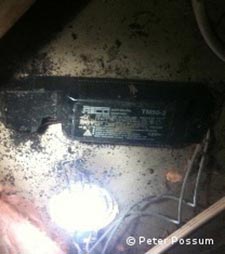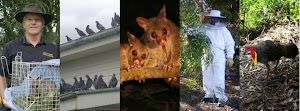Why have I got rats in my house?
Brisbane rats and mice breed well when there is sufficient food from native plants. An increase in their numbers does NOT always mean there are food scraps left about. In Autumn the cooler weather encourages rodents to move into warmer areas and the roof of a house is an ideal safe place.
Some reasons why there might be rodents in your area:
- neighbours are keeping chickens or guinea pigs (often leaving food scraps)
- someone is leaving cat or dog food outdoors, especially at night.
- there are poorly managed waste bins nearby.
- there are storm drains, streams or overgrown gardens nearby.
But remember, most properties in Brisbane are visited by rodents from time to time. It is not a reflection on the management of your property. Even the ceilings of multi storey buildings will get visits from rodents especially if there are tree branches touching the gutters.
What methods reduce the risk of getting rodents?
The key actions are good hygiene, keeping lawns trimmed, removing rubbish and any items leaning against walls that might provide easy shelter. Trees should be trimmed so there are no branches touching the roof or gutter that rats can use as an easy runway to your roof. The fallen fruit and nuts from trees like mangoes and macadamia should be collected. Around Brisbane it is noticeable that bamboo plants attract rats since they nest under the roots and eat new shoots.
The best action, before you notice a problem is to arrange for Peter the Possum and Bird Man to set up rodent bait stations around the property using plastic bait stations that are friendly to wildlife and safe to use around children and pets.
How do you get rid of rats?
The servicemen lay commercial grade baits which the rats eat and then they usually leave the cavity to go outside looking for water. We can also inspect for any main entry points, and advise on long term solutions. We also provide written advice with every rodent treatment. However it is not practical to completely exclude rats and mice from your property since they can gain access through quite small holes.
Do the rats die inside the roof?
As our servicemen are licensed pest controllers they have access to commercial grade baits which are very effective. With our treatments it is uncommon for rats to die inside the roof, but there is no guarantee. If they do die they do smell really bad but the good thing is that it is usually only for a few days. The best thing to do is open the house up as much as possible and ventilate the area to speed up the process, also using a neutraliser like Glen 20 can work well. Although the though of them dying inside is horrible, if you don’t do a treatment the rats will keep breeding and then when you are finally forced to lay the baits there will be more rats and a higher chance of one dying inside the building.
What damage can rats do?
Rats and mice are rodents which mean their teeth continually grow, so they have to gnaw wood or similar items to wear their teeth down. So rats will chew anything. They like to sleep near warm spots so often chew light fittings and electrical cables. They also chew plastic including plastic water-pipes and flexible water hoses on dishwashers. They often make holes in walls and build nests in insulation. This is why we recommend getting rid of rats straight away.
Will my child or dog be harmed?
When our servicemen lay baits to remove Brisbane rat they take extreme care to place them in secure locations where children and pets can’t access them. We work with children and pets everyday and will advise on pet safety during the consultation. Detailed advice on safety issues and rodent control is included in our written advice sheet.
Can you eliminate rats and mice?
Rodents breed very quickly if there is plenty of food, so a few adults can become one hundred in a year! (In theory). We can treat them and block off the main access holes, but they gain access through very small holes, so it is impossible to eliminate them.

Eliminate Rats and Mice






